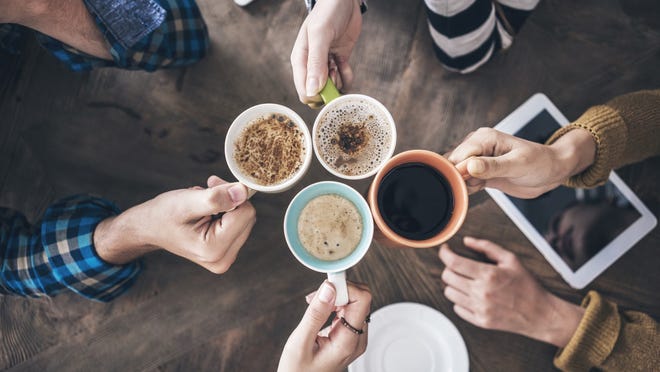There’s more data that being a coffee drinker can be good for your health.
Downing up to three cups of coffee daily is associated with lower risks for stroke and death from cardiovascular disease, as well as death from all causes, suggests research presented at the European Society of Cardiology Congress in France last week.
“Our results suggest that regular coffee consumption is safe, as even high daily intake was not associated with adverse cardiovascular outcomes and all-cause mortality after a follow-up of 10 to 15 years,” said study author Dr. Judit Simon of the Heart and Vascular Centre, Semmelweis University, in Budapest, Hungary, in a news release about the research. The study, yet to be peer-reviewed, was selected for presentation by the ESC program committee.
Coffee has long been thought to have health benefits with low to moderate consumption of coffee possibly supplying energy, alertness and increased concentration, according to the Harvard T.H. Chan School of Public Health. Previous peer-reviewed research has also suggested drinking coffee may reduce the risk of stroke, heart disease, heart failure, and certain cancers, as well as death from those diseases and other causes.
More health benefits of coffee:Drinking 3 to 4 cups of coffee a day reduces risk of liver cancer, study suggests
That’s good news because nearly 60% of all Americans drink coffee daily, with per capita consumption at nearly two cups per day.
Coffee drinkers had lower risk of stroke and death
This new study involved 468,629 participants of the UK BioBank database; none had signs of heart disease at the start of the study. Participants’ average age was 56.2 years and more than half, 55.8%, were women.
Compared to non-coffee drinkers, drinking up to three cups of coffee daily was associated with 21% lower risk of stroke, 17% lower risk of death from cardiovascular disease, and 12% lower risk of all cause death, the researchers said.
A comparison of heart MRIs revealed coffee drinkers “had healthier sized and better functioning hearts,” Simon said. “This was consistent with reversing the detrimental effects of aging on the heart.”
Further studies are needed to explain the health benefit, she said, but “this is the largest study to systematically assess the cardiovascular effects of regular coffee consumption in a population without diagnosed heart disease.”
But too much coffee can cause health problems
Coffee is not a magic beverage. For some, too much coffee can induce anxiety, jitteriness and insomnia. A daily average of no more than 400 milligrams of caffeine is recommended, according to public health experts at Harvard and Johns Hopkins University.
“Up to 5 cups of coffee each day can typically be considered safe according to studies and dietary guidelines,” said Seth Martin, a cardiologist and associate professor at Johns Hopkins Medicine
Does coffee help you lose weight?:Here’s the truth behind coffee myths
Have a Keurig or Nespresso?:Most coffee makers are crawling with germs and growing mold, experts say. Here’s why
When it comes to caffeine, coffee and coffee drinks can differ widely. A grande Starbucks coffee could have 260 to 360 milligrams depending on the roast – typically a darker roast has less caffeine – while a large Dunkin’ Coffee has 270 mg, according to the Center for Science in the Public Interest’s caffeine chart. A Starbucks grande latte or cappuccino has 150 mg; a Dunkin’ medium latte or cappuccino has 166. Most varieties of Keurig K-Cups make an 8 oz.- cup with 75 to 150 mg. In comparison, 1 Lipton Black Tea bag yields 55 mg.
Before you start downing more joe, you should know some research has suggested drinking too much coffee, four to six cups daily, can increase health risks.
So drink up, but don’t overdo it. Oh, and go easy on the cream and sugar because those additional calories can offset the potential health benefit. “When it comes to added ingredients such as creamer and sugar, it’s best to minimize them, or if you can, skip them altogether and enjoy coffee in its purest form,” Martin said.
Follow Mike Snider on Twitter: @MikeSnider.
